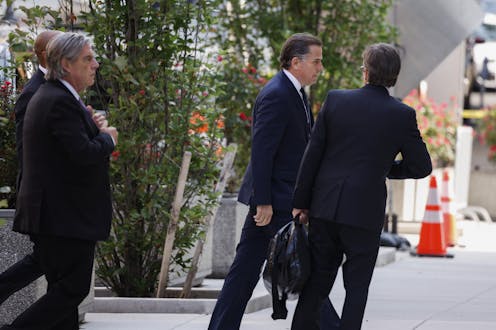Hunter Biden's plea agreement renegotiation is rare – a law professor explains what usually happens
- Written by Lorna Grisby, Senior Politics & Society Editor

The highly anticipated July 26, 2023, federal court appearance in Delaware by President Joe Biden’s son, Hunter, ended in a completely unanticipated way.
Hunter Biden was there to get the court to sign off on a plea deal[1] he and his lawyers had negotiated with the Department of Justice related to charges he had paid his taxes late and had illegally owned a gun. What was known of the agreement before the court date was that he would get two years’ probation for the unpaid taxes, which he had ultimately paid off, and that once Biden entered a diversion program, the gun charges would eventually be wiped from his record.
But that agreement was questioned by the judge in the case, Maryellen Noreika of Federal District Court in Wilmington, who wanted to know precisely how much immunity from prosecution the agreement gave Biden. He has been under a number of federal investigations since 2018. By the time the court session ended, the judge had sent the prosecution and defense to renegotiate the deal[2], which Biden’s lawyers said would take about two weeks.
The Conversation interviewed legal scholar Thaddeus Hoffmeister[3], an expert in criminal law, for more background on plea deals.
What is a plea agreement and how is one typically reached?
A plea agreement is sort of like a contract between the prosecution and the defense. They agree on what the defendant will be pleading guilty to, and once their agreement is reached, it goes to the judge for his or her blessing.
Generally speaking, if it’s a plea agreement, then something favorable is going to happen for the defendant. Usually, the charges are going to be reduced or the sentence is going to be less than if the defendant went to trial and was convicted.
A plea agreement avoids trial because the defendant agrees to accept some responsibility for the charges they face. If there’s no agreement, then ultimately the case will go forward.
Why do attorneys use plea deals?
It gives the government the certainty of a guilty plea, and prosecutors don’t have to worry about whether or not they will lose at trial and the defendant is acquitted. And it benefits the defendant because the defendant knows exactly what charges they are going to plead guilty to. If defendants go to trial, they are exposed to a much higher penalty.
Usually, the prosecutors will reduce a couple of charges if the defendant pleads guilty. In a plea deal, the defendant can also have an agreement about the sentence or the sentencing range.
What types of plea deals are there?
In some plea deals, the defendant agrees to cooperate with the government. In certain plea deals, the sentencing is not specified. That’s called an open plea. It’s not hammered out in terms of exactly what the sentence will be. All the agreement says is that you knowingly, voluntarily and intelligently admit to your guilt.
Is there a difference between state and federal plea deals?
No. It doesn’t vary too much.
The guilty plea process in federal court usually takes longer than state court. In state courts, pleas can happen fairly quickly. I’ve seen people plead guilty in 30 seconds in state court. It doesn’t take hours like it does in federal court, where prosecutors walk through every little step to make sure you understand what you are agreeing to. They don’t have the sheer number of defendants that the state courts have.
In what circumstances would a plea deal be offered?
It’s what we do every day – 95% of the criminal court cases in America are resolved through plea deals. The system would break if everyone charged with a crime went to trial. It’s standard.
It’s a regular process. Before the judge signs off, you have a good understanding of what the judge is going to do. I was surprised about the change in the Hunter Biden case today. I’m always taken aback when a judge doesn’t accept a plea. That always surprises me because these things are worked out beforehand between the parties.
It’s just a standard thing you do. The hard part is in the negotiation beforehand. Each side works to get a deal in their best interests and to make sure everyone’s on the same sheet of music. In this case, they weren’t.
Does a judge always have to sign off on a plea deal?
A defendant’s guilty plea, along with terms of a plea agreement between the defense and prosecution, goes into effect after the judge accepts the defendant’s plea. Plea agreements occur every day throughout the country. It’s a regular process of prosecutors and defense attorneys coming to agreements in plea deals. So all parties have a good understanding of what the judge is going to do. But, as we saw in the Hunter Biden case, sometimes judges reject plea deals.
Reportedly, according to Hunter Biden’s attorneys, their client was offered broad immunity from prosecution in perpetuity. Is such a deal common?
That type of immunity is rare. I would be surprised if the Department of Justice offered such immunity.
This story has been updated to clarify the role of judges in approving plea agreements.
References
- ^ sign off on a plea deal (www.politico.com)
- ^ sent the prosecution and defense to renegotiate the deal (www.nytimes.com)
- ^ legal scholar Thaddeus Hoffmeister (udayton.edu)
- ^ AP Photo/Julio Cortez (newsroom.ap.org)
- ^ Celal Gunes/Anadolu Agency via Getty Images (www.gettyimages.com)
Authors: Lorna Grisby, Senior Politics & Society Editor

